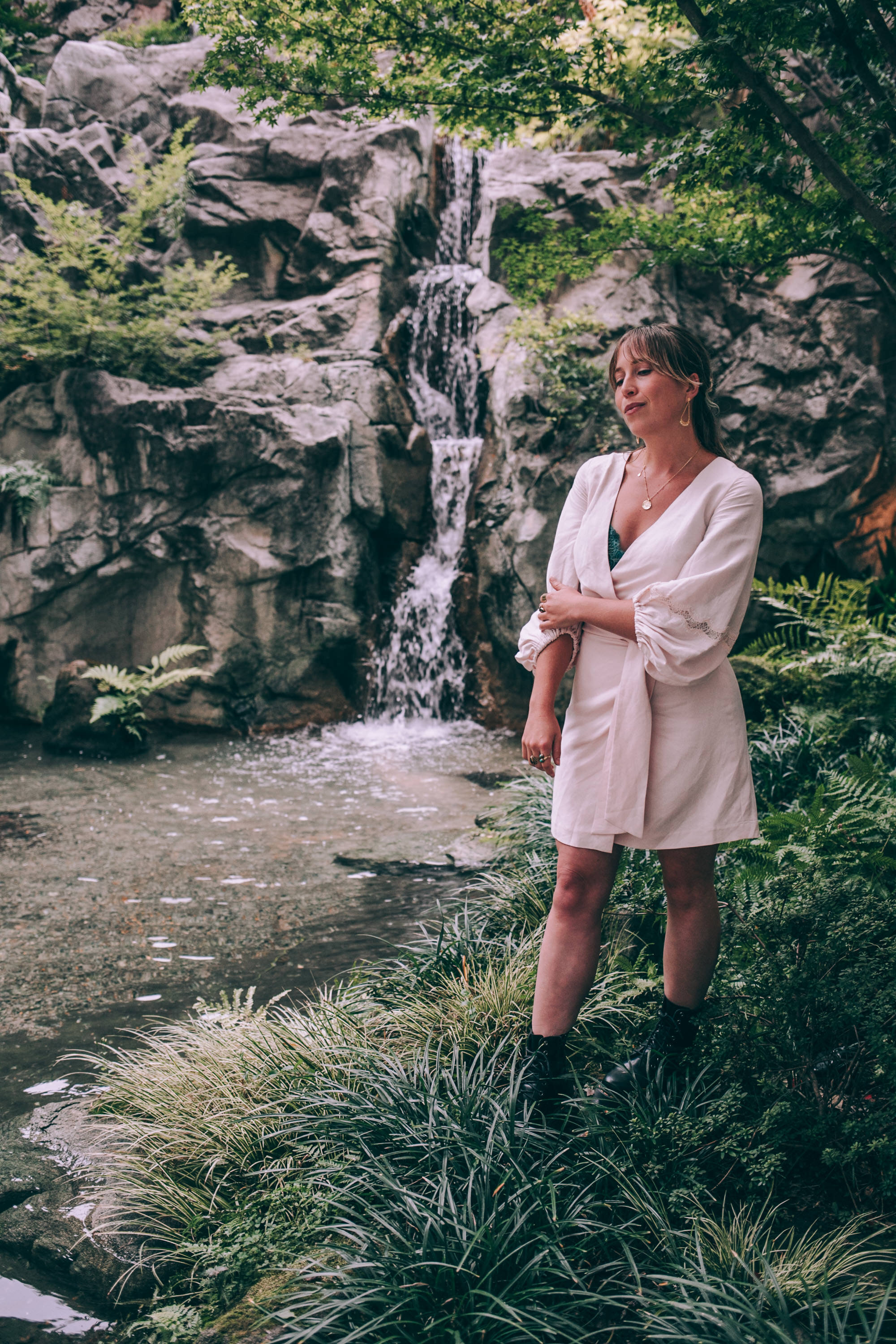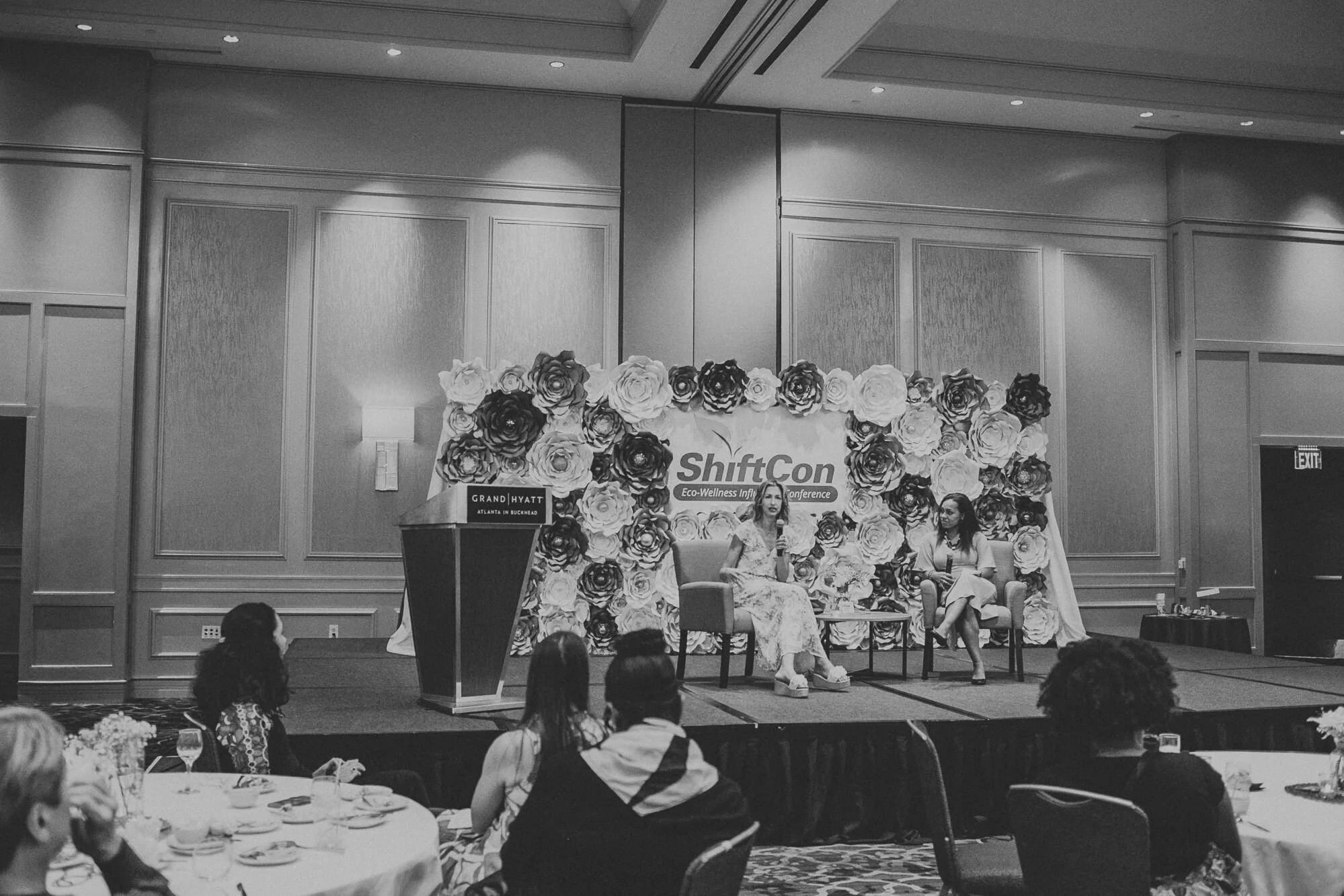Thoughts on Organic + Non-Toxic Living
non-toxic roll-on essential oil perfumes from mountain rose herbs
perfumes absorb directly into our skin and enter our bloodstream, which is why non-toxic options are so important
Early in October I had the opportunity to attend a wellness expo in Atlanta called SHIFTCON. I don’t often go to “influencer conferences” or expo’s generally — they can be overwhelming and draining, to say the least. But this one seemed so aligned with my mission I couldn’t help but be intrigued.
SHIFTCON is a very small expo that brings together what I would call “woke” brands and conscious influencers — with the intention of shifting culture positively. That is: using the intersection of influence and conscious capitalism to promote a less toxic, more transparent, eco-friendly, mindfully awake culture.
The expo was largely focused on conversations around organic and non-toxic living. I honestly didn’t think I would feel so inspired by these conversations and panel-discussions, as I already live a pretty non-toxic lifestyle. But I found myself jotting down notes furiously during sessions. I thought I would share a few things that stood out to me. Plus some lifestyle shifts I’m looking forward to adopting ASAP.
Here are a few of my take-aways on Organic and Non-Toxic living:
Organic or Bust
Greenwashing is still doing an impressive job of convincing the public that “natural” is in some way similar to Organic. The term “natural” in food only means it is free from added colorings and artificial or synthetic ingredients. Certified Organic continues to be the only way consumers can verify that their food, body care and home products are grown, made, produced without pesticides, toxic chemicals, hormones, artificial ingredients, synthetic preservatives and GMO’s. Organics require rigorously high production standards, which is why it’s hard to get certified. Preaching to the choir, I’m sure. But this was a very good reminder for me personally to stop compromising in order to save a buck.
Is Organic a Con?
As I was researching for this blog post I found multiple misleading articles positing that Organic is a con or conspiracy. Is Organic guilty of playing into consumer psychology and corporate greed? Sure. But I don’t see anyone calling fast food a “con” when they advertise healthy, happy people enjoying their soul-sucking sad-burgers. Organic exists to protect consumers from the toxic chemicals and un-researched GMO’s that have become quickly normalized in our food system. Woe be to she who ask questions, she must be a conspiracy theorist. Organic can’t help that it happens to be good business to sell people what they want — non-toxic options.
The savings from this beautiful second-hand dress will go towards my grocery budget.
Reshaping Our Mindset About Non-Toxic
My most pivotal mindset shift about this lifestyle is re-framing it as non-toxic instead of Organic. People are really hung up on the high price tag of Organic, which makes it seem elitist. In my mind “non-toxic” is about being a conscious consumer and choosing better-for-me options. Yes, Organic is a guiding star in this conversation. But you don’t need to know the name of the chicken you’re eating (alas poor Yoric I knew him well). You don’t need to start shopping at Whole Foods or buying $10 crackers. Focusing on “non-toxic” as I talk about this subject allows me to get to the root of this issue. Because it’s ultimately not about the vision of farmer John with happy little cows skipping through wildflower meadows. It’s about the negligent use of toxic chemicals in our food, bodycare, home and living products.
Non-toxic living is a right not a privilege. Our cleaning products shouldn’t poison our air and bodies. Makeup shouldn’t be a cancer-risk. We shouldn’t have to check an app to find out that the $1.99 conventional kale at the grocery might cause cancer (thanks to a pesticide called Dacthal).
I’m personally working on being more open to having these uncomfortable conversations with people in my life. My m.o. is to lead by example and show others that non-toxic be done without pretension. My goal is to be compassionate and informative. Sharing EWG.com and the Healthy Living app makes these covos much easier. On the site and app you can search thousands of products for their safety rating.
No Voice is Too Small
Every single person talking about this is important. The butterfly effect is real. And you might inspire the next movement that will change the world. Whether you have 2 or 2 million followers or friends, use your voice. I promise you, someone will hear you.
Gift The Solutions
If you’re having a hard time talking to people about non-toxic living, consider offering them a kind gift that can start a conversation. It doesn’t have to be a conversation about the planet. It can be about their health, their family, their homes. Essential oils are a generous gift and can get someone started with replacing artificial fragrances. You’ve got to start somewhere! I’ll be gifting my friends and family non-toxic conversations starters this Christmas, for sure!
Non-Toxic Without Compromise
Conventional food can be laden with pesticides. And most cleaning products on the market contain a range of harsh toxic chemicals, harmful fragrances and endocrine disruptors (and that’s just the half of it). Body care products are hardly better. The government is not choosing to rigorously protect its citizens from harmful products. So it’s up to us — the consumers — to protect ourselves from the negligence of brands and corporations. These chemicals can cause serious bodily harm — from disrupting our hormones to increasing allergen responses, triggering asthma, interrupting development in children, inciting cancer and more.
Many cleaning products contain known poisons that leach into our skin or are inhaled in non-ventilated homes! The air inside of the average home is actually more polluted than the air outside. How. Is. This. LEGAL?! All of this to say: you might already make DIY cleaning products, but the battle for a non-toxic world is not over. We need to continue to stand up to the industries that are producing toxic products and selling them to unwitting consumers. Arm yourself with knowledge. Tell your friends. Trash your toxic products. And open your windows.
Budget Woes vs. Glyphosate
Money is a big (the biggest?) qualm people have with Organic / non-toxic. Which is why we need to talk about where to start if you’re on a tight budget. In my opinion this starts with teaching people how to radically eliminate spending on things that they don’t care about (or that matter less). This is based on Ramit Sethi’s budget philosophy in his book I Will Teach You To Be Rich. This method is all about spending on what you love and cutting out every non-essential expense you don’t care about. If you want to go non-toxic and you’re spending cash on coffee shop drinks when you equally enjoy coffee at home, stop buying coffee out. You can free up hundreds, thousands of dollars a year with this method. Buy what you love. Ghost what you don’t. Using myself as an example I buy clothing secondhand, which saves me at least $1200 a year. That’s another $100 a month I can put towards groceries.
No one is expecting anyone to be perfect about buying only Organic all the time. You can use EWG’s “Clean 15 and Dirty Dozen” produce lists to ensure you’re avoiding the more toxic conventional produce. I buy conventional dried mango from Trader Joes, for example, because it’s on the “clean” list.
Did you know? Costco is one of the biggest consumers of Organics in the country! Walmart and Target also offer lots of Organic options. You can buy Organic at steep discounts via Thrive Market and Amazon. And most grocery stores now offer in-house brand Organics that are cheap-as-can-be and of equal quality to name brand. Not to mention the very cheap, easy DIYs you can make to replace most cleaning products (see: baking soda, vinegar).
Food is Just the Tip of the Iceberg
Realizing that health isn’t all about food, meditation and exercise has been a big mindset shift for me over the past few years. I never thought about my cleaning products, and my makeup claimed it was made with natural ingredients. But as with everything else, once I looked below deck I found some, uh, problems with the ship’s hull. Holes. Leaks. Sharks. You catch my drift. Constant vigilance!
Be A Beauty Rebel
Hi, hello, your makeup is toxic. Fun fact: body-care safety standards haven’t been updated since 1938. The EU bans over 1400 cosmetic ingredients. The USA bans 30. Yes you read that right! The cosmetic industry has been “self-regulating” and “self-policing” for a century. Beauty products can legally claim almost anything on their packaging, and can contain almost anything. The FDA has almost no power to recall unsafe products from the market. Your SPF can legally cause cancer (most contain chemicals like Oxybenzone linked to cancer). So here’s my bright idea. Research your current makeup and body care on EWG here. Throw out all of your toxic makeup. Invest in non-toxic options. Like: Beauty Counter, W3LL PEOPLE, Rejuva, Mineral Fusion, Babo, 100% Pure. I suggest Suntegrity for SPF. You could also go DIY with products from Mountain Rose Herbs and make your own beauty products! They have tons of resources on their blog.
Activism Works
If you’re feeling frustrated with the slow cultural shifts around (for example) single use plastics or toxic beauty products get politically active and send letters and emails to your senators, congress-people and local leadership. Call them. Attend protests. Start protests. If there’s anything we can learn from Greta Thunburg it’s that one person does make a difference. You can ask your senators to Co-Sponsor the Personal Care Act by clicking here. You can demand USDA and EPa protect Americans from Glyphosate by clicking here (click take action on the EWG page).
In Summary, Here A Few Ideas On What To DO About It
Check your personal products on EWG.org
Toss toxic products.
Replace with clean options — buy, grow or DIY.
Start a book club or movie club to get educated with friends. There are tons of documentaries on netflix and youtube.
Talk about it! On social media, with your friends, family and community.
Become an activist. Write to your local leadership. Call your senators. Protest. Connect with other activists. Vote! Anyone can be an activist on anything by talking publicly about the thing they’re concerned about.
If you have the means, give generous non-toxic gifts to friends as conversation starters. These essential oil roll-on perfumes from Mountain Rose are all only $10-$15!
Use the Clean Fifteen and Dirty Dozen lists to avoid the dirtiest produce.
Reshape how you think about non-toxic. It should be a right, not a privilege. So let’s start acting like it!
Don’t panic. And make sure you’ve got your towel.
Well, the towel thing is only important if the planet explodes and you need to hitchhike out of here. What I mean is it’s OK if your life isn’t perfectly non-toxic. Progress > perfection. I promise the world won’t blow up *fingers crossed* if you use up the last of your favorite lipstick.
Thank you to Mountain Rose Herbs for gifting me my expo attendance. All words and opinions are my own. Thank you for supporting the brands that support this site.
Actress and Activist Alysia Reiner at SHIFTCON




